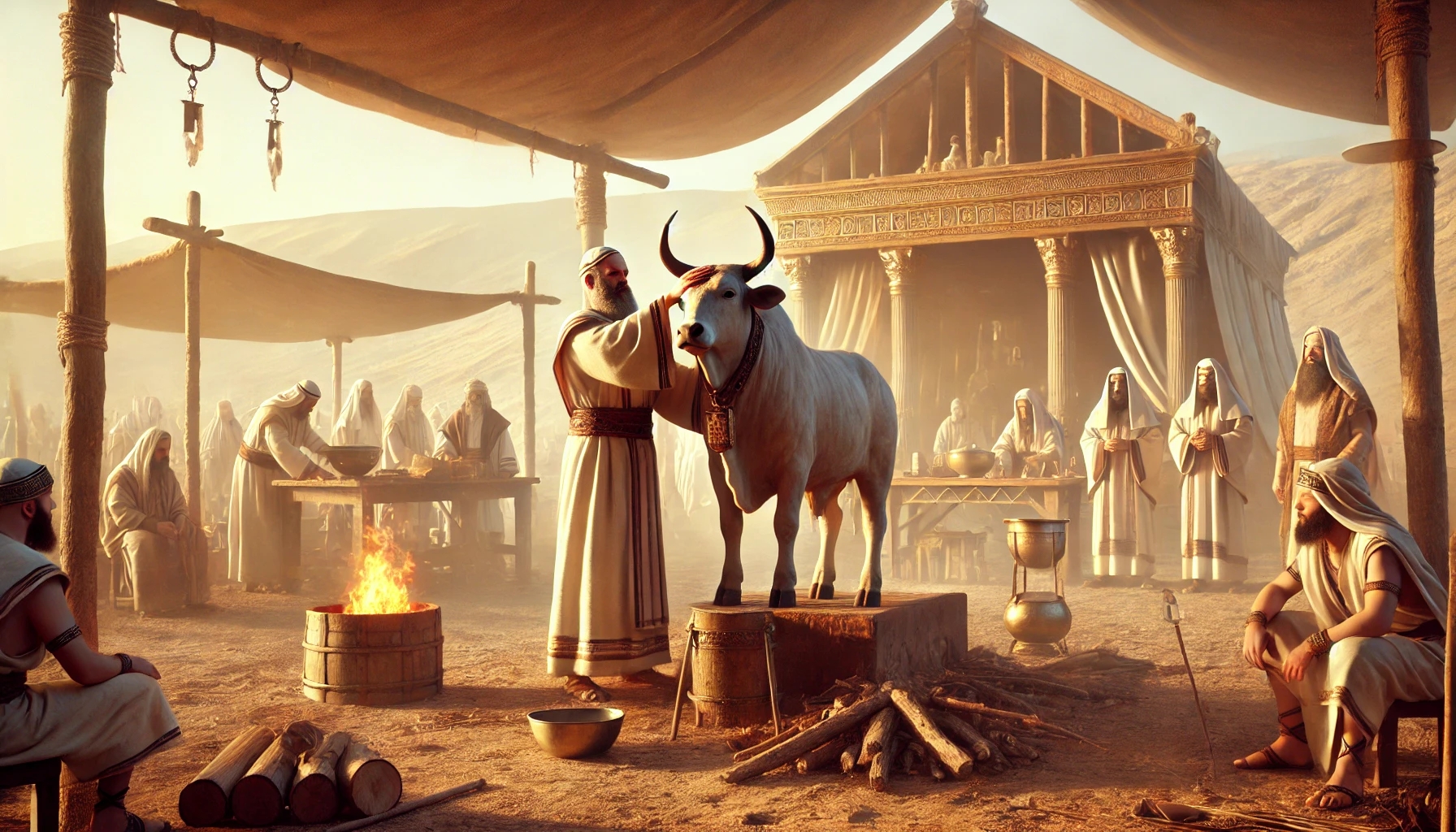
📖 The Message of Leviticus (3rd Book of Moses)
Theme: Holiness, closeness to God, and lived-out faith in everyday life
══════════════════════════════════════════════
🌟 Central Message
God is holy – and He calls His people to live holy lives as well.
Leviticus shows how people can relate to a holy God – despite their guilt.
It’s not just about sacrifices, rules, or rituals, but about a heart attitude: purity, obedience, community, and devotion.
══════════════════════════════════════════════
📚 What is the Book of Leviticus about?
1.Sacrificial Laws (Ch. 1–7):
How sin is forgiven and how people can thank God.
The sacrifices point to Jesus, the perfect sacrifice.
2.Priestly Service (Ch. 8–10):
Aaron and his sons are appointed as priests – a picture of Jesus as our High Priest.
3,Purity Laws (Ch. 11–15):
External purity as a symbol of inner purity. God wants us to live intentionally in all areas of life.
4.The Day of Atonement (Ch. 16):
The central day of the year – forgiveness of sins for the whole nation. A prophetic reference to Jesus’ sacrifice on the cross.
5.Holy Living (Ch. 17–27):
God shows what holiness in everyday life looks like: honesty, mercy, justice, purity, social responsibility, and true worship.
══════════════════════════════════════════════
💡 Why is Leviticus still important today?
It shows how serious sin is – but also how great God’s grace is.
It helps us understand Jesus better, as many sacrifices and rituals point to Him.
It challenges us to dedicate our whole lives to God – not just on the Sabbath, but every day.
It reminds us that holiness is not a burden but an expression of love for God.
══════════════════════════════════════════════
🙋♂️ What does Leviticus say to you personally?
“God wants to live with me – right in the middle of my everyday life.”
“He invites me to live differently – not perfectly, but wholeheartedly.”
“Holiness means aligning my thoughts, feelings, and actions with God’s heart.”
~~~~~ 🔥 ~~~~~
📅 July 16, 2025
📖 DAILY BIBLE READING
✨ Leviticus 1 – An Offering Pleasing to God
🔥 The Burnt Offering – A Symbol of Total Devotion
══════════════════════════════════════════════
📜 Bible Text – Leviticus 1 (KJV)
1 And the Lord called unto Moses, and spake unto him out of the tabernacle of the congregation, saying,
2 Speak unto the children of Israel, and say unto them, If any man of you bring an offering unto the Lord, ye shall bring your offering of the cattle, even of the herd, and of the flock.
3 If his offering be a burnt sacrifice of the herd, let him offer a male without blemish: he shall offer it of his own voluntary will at the door of the tabernacle of the congregation before the Lord.
4 And he shall put his hand upon the head of the burnt offering; and it shall be accepted for him to make atonement for him.
5 And he shall kill the bullock before the Lord: and the priests, Aaron’s sons, shall bring the blood, and sprinkle the blood round about upon the altar that is by the door of the tabernacle of the congregation.
6 And he shall flay the burnt offering, and cut it into his pieces.
7 And the sons of Aaron the priest shall put fire upon the altar, and lay the wood in order upon the fire:
8 And the priests, Aaron’s sons, shall lay the parts, the head, and the fat, in order upon the wood that is on the fire which is upon the altar:
9 But his inwards and his legs shall he wash in water: and the priest shall burn all on the altar, to be a burnt sacrifice, an offering made by fire, of a sweet savour unto the Lord.
10 And if his offering be of the flocks, namely, of the sheep, or of the goats, for a burnt sacrifice; he shall bring it a male without blemish.
11 And he shall kill it on the side of the altar northward before the Lord: and the priests, Aaron’s sons, shall sprinkle his blood round about upon the altar.
12 And he shall cut it into his pieces, with his head and his fat: and the priest shall lay them in order on the wood that is on the fire which is upon the altar:
13 But he shall wash the inwards and the legs with water: and the priest shall bring it all, and burn it upon the altar: it is a burnt sacrifice, an offering made by fire, of a sweet savour unto the Lord.
14 And if the burnt sacrifice for his offering to the Lord be of fowls, then he shall bring his offering of turtledoves, or of young pigeons.
15 And the priest shall bring it unto the altar, and wring off his head, and burn it on the altar; and the blood thereof shall be wrung out at the side of the altar:
16 And he shall pluck away his crop with his feathers, and cast it beside the altar on the east part, by the place of the ashes:
17 And he shall cleave it with the wings thereof, but shall not divide it asunder: and the priest shall burn it upon the altar, upon the wood that is upon the fire: it is a burnt sacrifice, an offering made by fire, of a sweet savour unto the Lord.
══════════════════════════════════════════════
🔵 Introduction
The Book of Leviticus begins with a powerful scene: God calls Moses from the Tent of Meeting – the place where He dwells among His people. He then gives precise instructions regarding the offerings.
Today, this might seem strange to us – sacrificing animals? Blood? Fire?
But these rituals are not empty or cruel; they are deep spiritual images.
They show how sinful people can approach a holy God.
And above all, they point to Jesus Christ – the perfect sacrifice.
══════════════════════════════════════════════
🟡 Commentary
-
📍 Place of Encounter: The Tent of Meeting (Verse 1)
God speaks from the sanctuary – He invites us to meet Him.
The relationship with Him begins with His initiative. -
🐂 The Voluntary Offering (Verses 2–3)
God forces no one. “Whoever wants to bring an offering to the Lord…”
The burnt offering is voluntary, yet complete.
The animal had to be without defect – a reference to Jesus (cf. 1 Peter 1:19). -
✋ Laying the Hand on the Offering (Verse 4)
The person identifies with the animal – a symbol of transferring guilt.
Through the offering, atonement is made. -
🔥 The Fire on the Altar (Verses 5–9)
The animal is burned completely – nothing is left.
The burnt offering symbolizes total devotion.
It is a sweet aroma to the Lord – not because of the smoke, but because of the heart behind it. -
🐑 Other Animals: Sheep, Goats, Birds (Verses 10–17)
God makes it accessible to everyone, even the poor (e.g., doves).
Everyone can bring an offering to God – it’s not about the value, but the intent of the heart.
Whether rich or poor – all are invited to dedicate themselves to God. -
🕊️ Order and Purity
The priests are to wash, arrange, and burn the offering – God is a God of order and purity.
Nothing is random. Holiness is never accidental.
══════════════════════════════════════════════
🟢 Summary
The burnt offering represents total devotion to God.
It prophetically points to Jesus, who gave Himself fully for us.
Everyone was allowed to offer – it was accessible to all.
The offering should be voluntary, wholehearted, and done out of love.
══════════════════════════════════════════════
📢 Message for Us Today
Even though we no longer offer animals, God still calls us to give ourselves:
👉 Am I willing to offer myself as a living sacrifice?
👉 Do I live with a heart that is a “sweet aroma” to God?
Romans 12:1 says:
“Offer your lives to God – as a living, holy, and pleasing sacrifice.
This is your true and proper worship.”
══════════════════════════════════════════════
💡 Reflection Questions
What would it mean for me today to give my whole life to God?
Not just on Sundays or when it’s convenient – but in my thinking, speaking, acting, and planning?
➡️ Maybe it’s time to give the Lord not just a part, but everything.
~~~~~ 🔥 ~~~~~
📆 July 13 – 19, 2025
📆 WEEKLY SPIRIT OF PROPHECY READING
📖 Ellen G. White │ Patriarchs and Prophets – Chapter 17
✨ Jacob’s Flight and Exile
📖 Read online here
══════════════════════════════════════════════
🔵 Introduction
Jacob does not leave his home as a hero, but as a fugitive—not because of external enemies, but because of inner guilt. And yet, on this very path—full of fear, uncertainty, and self-doubt—God’s faithfulness is revealed in a remarkable way. Chapter 17 of Patriarchs and Prophets vividly describes how God, despite guilt and flight, not only forgives His servant but uses him to fulfill His promises.
══════════════════════════════════════════════
🟡 Commentary
📌 1. Jacob flees – alone, afraid, and broken
Jacob leaves his parents’ home out of fear of Esau’s wrath.
He is filled with guilt and remorse, feeling abandoned—by his family and perhaps even by God.
In this solitude, he begins to pray honestly. His prayer is not prideful, but marked by humility and desperation.
📌 2. Heaven opens – the ladder from heaven (Genesis 28)
In a dream, Jacob sees a ladder connecting heaven and earth.
Angels ascend and descend—a picture of God’s service to us.
God Himself stands above the ladder and repeats the promise made to Abraham—now it applies to Jacob!
Jacob not only receives assurance but also a promise: “I am with you… I will not leave you.”
📌 3. Jacob awakens – from sinner to worshiper
Jacob realizes: “Surely the Lord is in this place, and I did not know it!”
He sets up a stone pillar, names the place Bethel (“House of God”), and makes a vow—not as a bargain, but out of gratitude.
He vows to remain faithful, to give a tenth, and to follow God.
📌 4. Jacob in Haran – faithful despite disappointment
In Haran, Jacob meets his future wife Rachel.
He serves seven years—out of love, faithfully and patiently.
But Laban deceives him. Instead of Rachel, he is given Leah.
Jacob is betrayed—yet he stays.
In total, he serves 20 years, is cheated multiple times, but God blesses him despite all human injustice.
📌 5. The return – decision in distress
Jacob realizes it’s time to return home.
He prays again—remembering God’s promise at Bethel.
God answers: “Return… I am with you.”
Laban pursues him—but God protects Jacob.
A peace covenant is made, marked with the name Mizpah – “The Lord watch between you and me.”
══════════════════════════════════════════════
🟢 Summary
Jacob begins his journey as a fugitive burdened by guilt, fear, and uncertainty. But God meets him—not with punishment, but with grace. On the difficult road into exile, Jacob grows spiritually, is shaped through trials, and ultimately remains faithful to God. A deceiver becomes a shepherd, a father, and a bearer of the promise.
══════════════════════════════════════════════
📢 Message for Us Today
We too experience times of guilt, loneliness, and uncertainty. We may feel like failures, misunderstood, or taken advantage of. But God does not abandon us.
It is often in the deepest valleys that He reveals His faithfulness.
Jacob’s story shows us:
-
God starts new journeys with broken people.
-
Your past does not determine your calling.
-
God is faithful to His promises—even when we fail.
══════════════════════════════════════════════
💬 Reflection Question
-
Have I ever encountered God like Jacob—in the midst of crisis?
-
What is my “Bethel”? Where has God shown me His presence?
-
Am I ready, like Jacob, to entrust God with my life, my gifts, and my tithe?
-
What do I need to let go of today in order to follow God’s call to return?





















